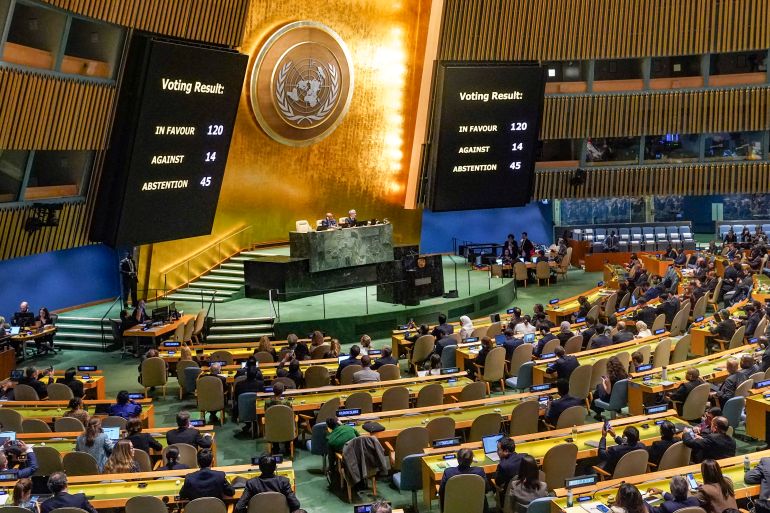In a momentous decision, the United Nations General Assembly voted overwhelmingly in favor of a resolution, spearheaded by a coalition of 22 Arab nations, calling for an immediate humanitarian truce between Israel and the Palestinian armed group, Hamas. The vote took place amid escalating hostilities in the region and a growing global concern over the civilian toll in the conflict.
Global Show of Support
In a remarkable display of international consensus, the resolution passed with an emphatic margin of 120 votes in favor to just 14 against, with 45 member states abstaining. This resounding approval underscores the urgent need for a cessation of hostilities and the humanitarian crisis that has unfolded in Gaza and southern Israel. Notably, both the United States and Israel cast dissenting votes, while a significant portion of the international community backed the resolution.
Powerful Statements on the World Stage
Ahead of the vote, Jordanian Foreign Minister Ayman Safadi passionately articulated the dire consequences of opposing the resolution, stating that a vote against it equates to approving the ongoing “senseless war” and the tragic loss of lives. In contrast, Israel denounced the UN decision as an “infamy,” reflecting the deep divisions in the international arena regarding the Israeli-Palestinian conflict.
Non-binding, but Symbolic
The adopted resolution, while non-binding, serves as a critical indicator of global opinion at a time when the conflict between Israel and Hamas is approaching its third week. This period has been marked by a Hamas assault on southern Israel that claimed over 1,400 lives. Notably, the General Assembly convened as Israel intensified its bombardment of Gaza, leading to disruptions in communication services and limited ground confrontations, hinting at a potential invasion.
A Response to Security Council Inaction
This landmark decision by the General Assembly comes after the UN Security Council’s two-week-long impasse, with the United States and Russia wielding their veto powers to thwart proposals supported by the rest of the Council. The international community’s growing impatience and the mounting civilian casualties played a pivotal role in shifting the focus to the General Assembly.
Key Points of the Resolution
The resolution calls for an “immediate, durable, and sustained humanitarian truce leading to a cessation of hostilities.” It explicitly “firmly rejects any attempts at the forced transfer of the Palestinian civilian population.” The need to prevent a broader escalation of the conflict and the demand for increased humanitarian aid for Gaza, where only a limited number of aid trucks have gained entry in recent weeks, were central aspects of the resolution.
However, a proposed Canadian amendment, which aimed to condemn the Hamas attack, did not secure the required two-thirds majority. The resolution does call for the immediate release of all civilians held hostage and condemns “all acts of terrorism and indiscriminate attacks,” but it refrains from specifically naming Hamas.
Israeli Ambassador to the UN, Gilad Erdan, argued that a ceasefire would merely give Hamas an opportunity to rearm itself, emphasizing that the vote’s intent was not to bring peace but to “tie Israel’s hands.” Erdan had previously stated that “The only place this resolution belongs is in the dustbin of history.”
As the international community weighs in on this landmark UN decision, the situation on the ground in Gaza and Israel remains precarious, with hopes for a lasting ceasefire now resting on the implementation of the General Assembly’s resolution.















